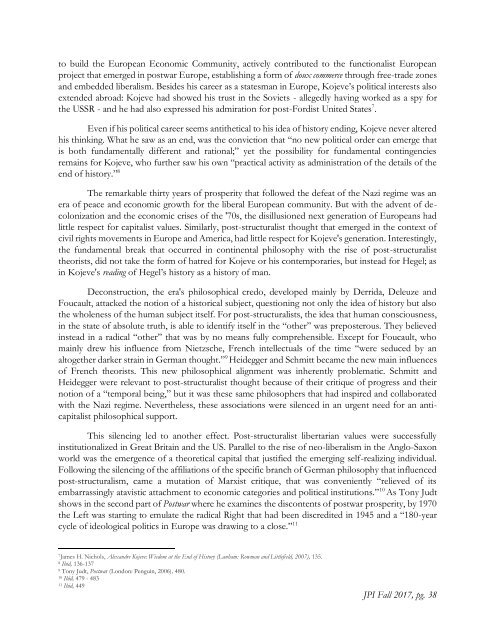Fall 2017 JPI
You also want an ePaper? Increase the reach of your titles
YUMPU automatically turns print PDFs into web optimized ePapers that Google loves.
to build the European Economic Community, actively contributed to the functionalist European<br />
project that emerged in postwar Europe, establishing a form of doux commerce through free-trade zones<br />
and embedded liberalism. Besides his career as a statesman in Europe, Kojeve’s political interests also<br />
extended abroad: Kojeve had showed his trust in the Soviets - allegedly having worked as a spy for<br />
the USSR - and he had also expressed his admiration for post-Fordist United States 7 .<br />
Even if his political career seems antithetical to his idea of history ending, Kojeve never altered<br />
his thinking. What he saw as an end, was the conviction that “no new political order can emerge that<br />
is both fundamentally different and rational;” yet the possibility for fundamental contingencies<br />
remains for Kojeve, who further saw his own “practical activity as administration of the details of the<br />
end of history.” 8<br />
The remarkable thirty years of prosperity that followed the defeat of the Nazi regime was an<br />
era of peace and economic growth for the liberal European community. But with the advent of decolonization<br />
and the economic crises of the '70s, the disillusioned next generation of Europeans had<br />
little respect for capitalist values. Similarly, post-structuralist thought that emerged in the context of<br />
civil rights movements in Europe and America, had little respect for Kojeve's generation. Interestingly,<br />
the fundamental break that occurred in continental philosophy with the rise of post-structuralist<br />
theorists, did not take the form of hatred for Kojeve or his contemporaries, but instead for Hegel; as<br />
in Kojeve's reading of Hegel’s history as a history of man.<br />
Deconstruction, the era's philosophical credo, developed mainly by Derrida, Deleuze and<br />
Foucault, attacked the notion of a historical subject, questioning not only the idea of history but also<br />
the wholeness of the human subject itself. For post-structuralists, the idea that human consciousness,<br />
in the state of absolute truth, is able to identify itself in the “other” was preposterous. They believed<br />
instead in a radical “other” that was by no means fully comprehensible. Except for Foucault, who<br />
mainly drew his influence from Nietzsche, French intellectuals of the time “were seduced by an<br />
altogether darker strain in German thought.” 9 Heidegger and Schmitt became the new main influences<br />
of French theorists. This new philosophical alignment was inherently problematic. Schmitt and<br />
Heidegger were relevant to post-structuralist thought because of their critique of progress and their<br />
notion of a “temporal being,” but it was these same philosophers that had inspired and collaborated<br />
with the Nazi regime. Nevertheless, these associations were silenced in an urgent need for an anticapitalist<br />
philosophical support.<br />
This silencing led to another effect. Post-structuralist libertarian values were successfully<br />
institutionalized in Great Britain and the US. Parallel to the rise of neo-liberalism in the Anglo-Saxon<br />
world was the emergence of a theoretical capital that justified the emerging self-realizing individual.<br />
Following the silencing of the affiliations of the specific branch of German philosophy that influenced<br />
post-structuralism, came a mutation of Marxist critique, that was conveniently “relieved of its<br />
embarrassingly atavistic attachment to economic categories and political institutions.” 10 As Tony Judt<br />
shows in the second part of Postwar where he examines the discontents of postwar prosperity, by 1970<br />
the Left was starting to emulate the radical Right that had been discredited in 1945 and a “180-year<br />
cycle of ideological politics in Europe was drawing to a close.” 11<br />
7James H. Nichols, Alexandre Kojeve: Wisdom at the End of History (Lanham: Rowman and Littlefield, 2007), 135.<br />
8 Ibid, 136-137<br />
9 Tony Judt, Postwar (London: Penguin, 2006), 480.<br />
10 Ibid, 479 - 483<br />
11 Ibid, 449<br />
<strong>JPI</strong> <strong>Fall</strong> <strong>2017</strong>, pg. 38
















